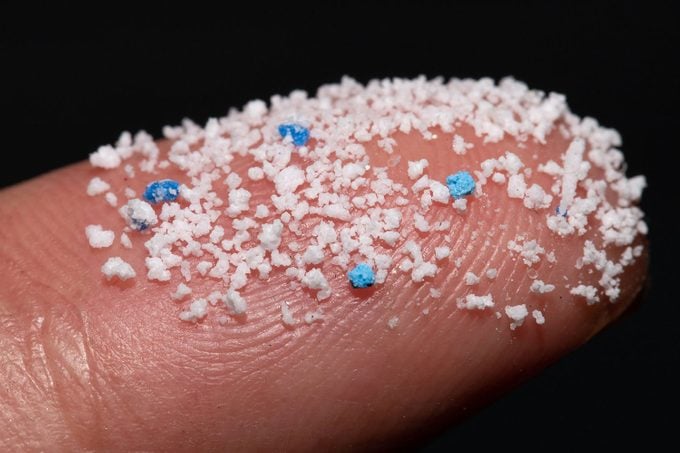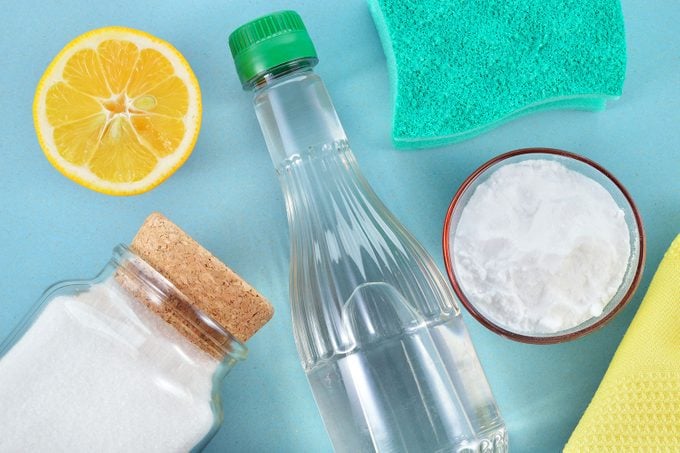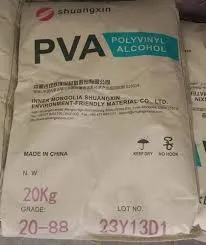In this country, we use an estimated 20 billion dishwasher and laundry pods and sheets each year. Each one is made with or wrapped in polyvinyl alcohol, or PVA. Although that wrapping seems to magically disappear, a recent study showed 75% of it actually ends up in our waterways.
“Most people don’t realize that the material used to individually wrap single-dose laundry and dishwasher detergent pods is actually plastic,” says Sarah Paiji Yoo, co-founder and CEO of Blueland cleaning products. “Like other forms of plastic pollution, PVA has the potential to cause harm to the environment, plants and animals.”
Nearly all leading brands, conventional and natural, use PVA in their laundry and dishwasher pods. Here’s what to know about polyvinyl alcohol and its effects on the environment.
What Is Polyvinyl Alcohol?
Polyvinyl alcohol, aka PVA, PVOH or E1203, is a synthetic plastic polymer. In our homes, it’s most commonly found as the thin wrapping around dishwasher and laundry pods. It’s also woven into disposable laundry sheets to keep them intact.
“Another term, that is not scientifically correct, but which summarizes the characteristics of PVA as dissolution, dispersion or swelling in water, is ‘liquid plastics,’ ” says Stefano Magni, Ph.D., a researcher in ecology at the Department of Biosciences of the University of Milan.
PVA is often marketed as eco-friendly because it appears to readily dissolve in water, but its safety has recently been called into question.
In 2022, 16 nonprofit groups, along with Blueland, petitioned the Environmental Protection Agency (EPA) to urgently study and regulate PVA in consumer packaged goods and remove it from its Safer Choice and Safer Chemical Ingredients lists. (The EPA formally rejected the petition in April 2023.)
Is Polyvinyl a Microplastic?

Not technically, says Magni. Microplastics are solid particles that aren’t water-soluble, whereas PVA is a water-soluble polymer.
“For this reason, the conventional plastic pollution is a more visible and perceived problem by citizens than ‘liquid plastic’ contamination,” says Magni. “In this context, PVA, due to its ‘liquid’ state in water, escapes from the current restrictions to limit [micro]plastics.”
But PVA is made from a fossil-fuel-derived thermoplastic and is known to end up and persist in the environment. So in that sense, it’s similar to a microplastic.
High Purity 99% pva industrial grade polymer powder polyvinyl alcohol pva good price pva 1788 2488 powder
What Is Polyvinyl Alcohol Used For?
Besides dishwasher and laundry pods, PVA is used in fishing bait and dissolvable laundry sheets. PVA is also found in a wide range of industrial applications, including:
- Fibers for construction supplies;
- Paper making;
- Industrial sealants, adhesives and sprays;
- Cosmetics;
- Packaging materials;
- Food additives;
- Textiles and clothing;
- Latex coatings;
- Pharmaceuticals;
- Biomedical products, including lubricants in contact lenses.
Is Polyvinyl Alcohol Bad for the Environment?
Probably. But so far, there hasn’t been much research into it.
“Although PVA is generally considered safe, more information about its potential eco-toxicity, especially on aquatic organisms, is urgently needed,” says Magni. “In addition, there are some concerns about the PVA biodegradation, when this chemical reaches the aquatic environment.”
One problem with PVA: It only appears to dissolve. “Think about what happens when you mix salt with water,” says Erica Cirino, an author and communications manager at Plastic Pollution Coalition. “Just because you can’t see all the tiny grains of salt in the water as they dissolve doesn’t mean the salt doesn’t still exist.”
Other potential problems and risks include:
- Most wastewater treatment plants don’t break down or capture PVA, so it ends up in oceans, rivers, canals and soil.
- Once PVA is in the environment, it can enter and rise up the food chain. This worries experts because it can potentially absorb dangerous chemicals, antibiotics and heavy metals at high concentrations.
- Recent studies found PVA in human breast milk, and there isn’t much unbiased research about its health effects. “Health-related research on PVA/PVOH has almost exclusively been conducted on nonhuman animals such as rodents and dogs by PVA/PVOH producers,” says Cirino. “What little research has been done on humans shows concerning links to inflammation and irritation, especially when PVA/PVOH exposure occurs over a prolonged period.”
- Like with most plastics, PVA manufacturing facilities are disproportionately located in underserved low-income, rural, and BIPOC communities, fueling health and environmental injustices.
- Producing PVAs, like all plastics, releases greenhouse gases and chemicals known to cause human health problems.
Though the EPA declined to take up the issue, those concerned with PVAs are exploring other steps, including creating a signature petition to show public support for increased PVA research.
Alternatives to PVA Pods and Sheets
If you’d like to ditch PVA, here are some alternatives from Cirino.
DIY laundry soap
Combine 14 ounces of washing soda (sodium carbonate) with 14 ounces of borax (sodium tetraborate) or baking soda (sodium bicarbonate) with 4.5 ounces of natural Castile soap flakes.
Try to buy ingredients in bulk, paper or refillable containers and store the mixture in a sealed glass jar or metal tin. Use one tablespoon of homemade laundry soap per small load, and two to three tablespoons per large load.
DIY dishwasher soap

Combine one cup washing soda, one cup baking soda, one cup food-grade citric acid powder and one cup kosher salt. Store in an airtight plastic-free container. Use one to two tablespoons per load of dirty dishes.
You can also turn the mixture into hardened dishwasher tabs by swapping the citric acid powder for one cup lemon juice, then let the mixture harden overnight in a reusable ice cube tray. Use one tablet per load of dirty dishes.
Purchased products
When buying laundry soap, seek natural, powdered formulations without plastic ingredients or packaging, like those from EarthHero, Meliora and Blueland. Also, search Plastic Free Future’s map to find out if there’s a refill shop near you, where you can purchase bulk natural liquid or powdered laundry detergents.






